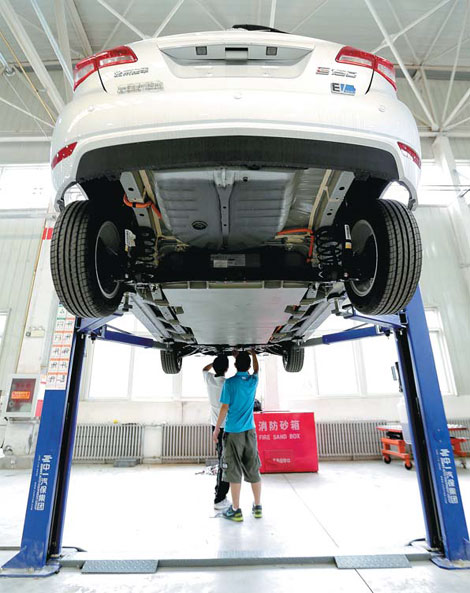Charging toward a new-energy market
Govt incentives to keep firms interested in sector
As the government moves to stimulate sales of new-energy vehicles, a list of pure electric, plug-in and fuel-cell models exempt from sales tax will be released later this month, according to the Ministry of Industry and Information Technology.
With taxes averaging about 10 percent of the sticker price on new cars in China, the measure effective from Sept 1 should give a boost to the industry, said industry experts.
|
Engineers examine the battery of an electric car manufactured by Beijing Automobile Industry Co. Wang Zhen / For China Daily |
Customers in southern and eastern China might applaud the measure, but it is likely to have little impact in the country's vast northern regions.
With current battery technology, electric vehicles do not perform well in cold weather.
Pang Yicheng, CEO of the news portal d1ev.com, said some automakers admitted their electric vehicles are sold only in regions south of Beijing because they worry their batteries might not work well farther north - where temperatures can fall to minus 30 C or even 40 C in winter.
Lithium batteries are designed to still work down to minus 25 C and as high as 60 C, but performance drops sharply in temperatures below zero, said Tong Deming, general manager of battery maker Microvast.
Sun Fengchun, vice-president of the Beijing Institute of Technology, said electric vehicles that can run 100 kilometers at 25 C might have a range of less than 50 kilometers when the temperature falls to minus 25 C.
Forbes magazine reported that the AAA Automotive Research Center in Southern California found similar results when it tested three different electric vehicles under controlled circumstances to gauge their performance.
The test found the three models averaged a range of 105 miles at 24 C, but the figure plummeted to just 43 miles when the thermometer dipped to minus 7 C.
Compounding the problem, it takes almost double the time to charge batteries in frigid temperatures.
Sun of the Beijing Institute of Technology said his experiments show that batteries requiring 5.5 hours to fully charge at 25 C take 9 hours at minus 25 C.
Earlier this year Tesla CEO Elon Musk apologized to Model S owners in Norway when they complained their cars were difficult to charge when temperatures fell below zero.
And under extreme conditions batteries do not charge at all.
"It is just like your mobile phone. It will turn off and will not charge when it is too cold," said Xiong Jinfeng, a new energy engineer at Higer Bus Company.
Battery companies around the world are trying to tackle the problem in different ways. But before any major breakthrough is made, some electric vehicle producers are providing batteries with a good working environment by installing heaters and air conditioning systems to keep them in their power zone.
Lin Cheng, deputy director of the National Engineering Lab for Electric Vehicles, said the approach is mainly for electric buses because the cost is too high for private users.
He said the problem might be solved in four to five years as scientists push back frontiers in the field.
"It won't be a dream to charge an electric car for 10 minutes at minus 20 degrees and it will run 300 kilometers," said Lin.
He said electric vehicles have a bright future despite current problems because they provide smooth operation, strong acceleration, require less maintenance than internal combustion engines and offer a cost-effective option for many.
Statistics from the China Association of Automobile Manufacturers show that 25,900 new-energy vehicles were produced in the first seven months of the year. Of them, 13,800 were pure electric, almost seven times the figure in the same period last year.
With universities a major source of innovation, Wang Duoxiang, dean of the College of Engineering at Peking University, called for universities and companies to join together to solve existing problems.
"Universities play a very important role in promoting industrial development. Among others, IT giants Cisco and Intel give almost half of their R&D funds to universities," Wang said when he addressed the opening ceremony at an industrial park for new-energy vehicles in Baotou, Inner Mongolia.
lifusheng@chinadaily.com.cn





















